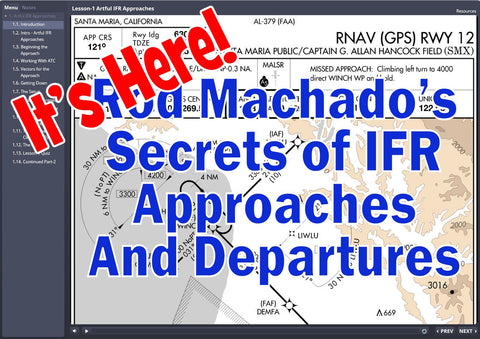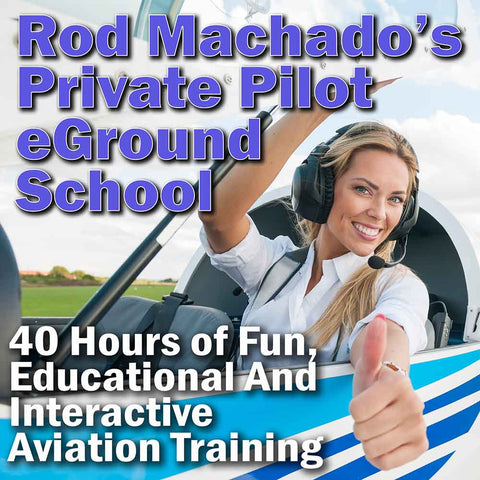By Rod Machado
 Over the years, I’ve heard many stories about middle-aged pilots (45-65 years) who gave up flying due to a sudden onset of anxiety. Apparently this wasn’t induced by any specific aviation trauma nor inspired by the relatively small and perfectly normal decline of reflexes and mental agility experienced by most middle aged pilots. What in the world might spook a 50-ish pilot into abandoning something he obviously once loved to do?
Over the years, I’ve heard many stories about middle-aged pilots (45-65 years) who gave up flying due to a sudden onset of anxiety. Apparently this wasn’t induced by any specific aviation trauma nor inspired by the relatively small and perfectly normal decline of reflexes and mental agility experienced by most middle aged pilots. What in the world might spook a 50-ish pilot into abandoning something he obviously once loved to do?
First, let me make it clear that there are probably as many answers to this question as there are belly button rings at a Madonna concert. I’d suggest that the most likely cause has something to do with the emotional baggage a pilot accumulates with age. I’m speaking of baggage caused by the unhealthy focus on a pilot’s own mortality, which may result from obsessing over aviation accident data (no doubt there are many other causes, as well). Fortunately, he’s not forced to pay an additional $25 per emotional bag checked during his travels toward middle age, or he’d go broke. The price he actually pays involves worrying about the many possible ways an airplane could smite him.
By the time a pilot reaches the age of 50, he’s been around long enough to hear or read about several of the ordinary and imaginative ways aviators have employed to vaporize themselves in an airplane. For convenience, let’s call this information the dark side of aviation. Long term exposure to the dark side often assaults the mind, lays siege to the emotions and spooks an otherwise mentally healthy pilot. Whatever desire someone has for living a long, healthy life now collides with the memories of those unfortunate pilots who didn’t have one.
While clock time is still technically on the middle aged pilot’s side, he no longer feels this advantage. Instead, flying becomes a game of chance, rather than the practical management of risk that it is. At this point, some pilots begin to slowly reevaluate—perhaps over a period of years—their desire to flying. For others, it’s as if they wake up one day and out of the blue decide they no longer want to soar into it. The net result is an exit strategy that resembles how an engineer behaves when he accidentally stumbles into a coffee shop hosting a poetry reading. It may look voluntary, but it's essentially coerced by anxiety.
If a pilot surrenders to these emotions, he’s essentially letting the deceased determine how he lives. Inasmuch as the NTSB conservatively estimates that 75% of accidents are due to pilot error, we know that fate didn’t hunt at least three-quarters of the pilots involved in aviation’s dark side events (the percentage of pilot-error-type-accidents is really much, much higher). The suggestion here is that these unfortunate pilots made a choice, and they chose wrong.
So what’s an older pilot to do when his mortality-induced anxiety compels him to question his desire to fly? I’d argue that a good answer is as simple as deciding to have a little more faith in himself, and his ability to choose wisely in the air.
There’s a very good basis for such faith, too. Living to middle age has to count for something in terms of the wisdom a pilot accumulates. Unlike King Lear in Shakespeare's famous play, few people grow old without growing wise. Surely Bob 5.0 is nothing like Bob 2.0. The later version of Bob better understands his/her strengths and weaknesses, as well as how human nature affects his behavior. This is the knowledge that makes us wise, is it not?
For example, an awareness of human nature may make Bob aware of his desire please his passengers, at the cost of aviation safety (wanting to please others to sustain group cohesion is fundamental to human nature). Wise man that he is, Bob 5.0 now elects to protect himself by obtaining his passengers’ agreement to cancel the flight and reschedule for another day if the weather is poor.
From a flight safety perspective, knowledge of self (wisdom) is worth a hundred times more than what a pilot may know about how airplanes fly (flight experience). Said another way, age-related wisdom can help us avoid situations where we might have to use our superior skill. And that wisdom helps us avoid situations that require superior skill we might not have.
Based on understanding how wisdom confers a cockpit advantage, the middle aged pilot with mortality-induced anxiety should find comfort in knowing that he’s probably a much safer pilot than he (or she) gives himself credit for. As a result, he should learn to trust himself and his ability to fly safely as a means of combating his anxiety. Is the answer really as simple as that? Consider that, from a cognitive perspective, learning to trust oneself is as solid a therapeutic concept as are the drugs used to treat physical illness. So, the answer can be that simple.
To be clear here, I’m not suggesting that wisdom always trumps the age related decreases in a pilot’s physical/cognitive performance. In fact, some middle age pilots are anxious because they know they’re less skilled than they once were. Wise pilots that they are, they'll most likely opt to fly within the range of their performance limits. Perhaps they'll sell that twin Cessna and opt for a Cessna 182 instead. In this article, I'm speaking only of how a capable middle aged pilot might overcome his mortality-induced anxiety by simply placing more faith in himself and his abilities.
If you’re one of these middle aged pilots suffering from the anxiety induced by aviation’s dark side, then isn’t it better to just learn the lessons offered by fallen aviators, instead of bringing the deceased with you on every flight? Let them rest in peace so you may find greater peace in flight.




13 comments
I was wondering if anyone could offer any guidance for me… I had a really bad experience with vertigo in IMC one night when I had about 320 hours TT. The anxiety that I had most flights following that was so bad that I ended up making excuses to not fly. This ended up turning into a ten year hiatus from the skies. In 2020, I decided to face my fears and work through the anxiety. I made a lot of progress and things were going well. I flew about 80ish hours in the past 2.5 years, and all was going well. About 2 weeks ago, for whatever reason, the anxiety came back and smacked me in the face. I have no idea why, but it is aggravating to say the least. I feel like so much of being a pilot is having confidence. However, when things like this happen, my confidence is destroyed. The lack of confidence then only creates more anxiety every time I fly. I feel like this is a cyclical problem that I need to break- I just don’ know how.
I work full-time in law enforcement, and have experienced plenty of traumatic events in the past 20 years. I have gone to therapy to help process some of those events, and therapy did help some. I have to think that my flying anxiety is somehow correlated to what I have experienced in my law enforcement career, but that’s just a guess. I have always been dead set against the idea of being on any kind of medication for anxiety, but I am starting to wonder if maybe I should give it a try. Of course there are the concerns with how do I address this with the flight doc when it comes time for a medical… Can anyone out there help?
After early retirement from Cessna Marketing at age 56, I thought it adventuresome to delve into pipeline patrol — two years and more than 2,000 flight hours, all on the stick at 300 feet AGL. One day the ceiling fell and I found myself climbing over 30-foot power lines in the frozen middle of nowhere. With no time for a pop-up clearance, I made a quick decision to climb out of there, as a glimmer of sunlight beckoned. About five minutes later, as I nursed the 150 hp Cardinal in a 500 rpm climb with icing on the glare shield, an unreliable attitude indicator told me I was going to die. Yet, there was no fear — just a quiet sense of peace. When I broke out on top at around 7,000 feet, I like to say I saw the face of God. That was 12 years ago; and I still like to fly my 150 close to the ground. I’m now at peace knowing that flying — as is life itself — is a gift from God.
HI Ron. I’m a mediacally “retired” airline pilot, but still love flying light planes. I really wish it were as simple as telling myself to “buck up buddy” and pressing on. As much as I loved the airline, there are a lot of pressures and conditions that make any little anxiety and / or medical condition manifest in much more demanding, distracting, and dangerous ways. I would encourage anyone who thinks they have a medical or emotional problem to get all the professional help they can, but you really can’t just make it all go away by force of will or desire. I’d much rather see someone keeping their distance from aviation until they have their issues resolved, than allowing their ego to create dangerous situations. I’d add “suck it up – itis” to the long list of things that can get in the way of flying safely and enjoying this wonderful gift.
Fly safe
Been flying the the better part of 48 years. Wouldn’t consider giving it up any more than eating or breathing. Each flight is an extra bit of “life infusion”. You summed it up perfectly..wisdom stands the test of time.
I first started to fly in 1964. Got my licences over the next 2 years and got a job as a co-pilot initially on DC-3s in 67. and went onto DC-8s as an SO in 1970. After 4 years, had enough. Long story !! But now have the bug to get back in the air at 76 y.o. One bump in the road – hearing but if I get the cochclear operation I will go for it. So many new exciting adventures ahead and a good understanding of limitations I must face. What a wonderful reason to rejoin something I should never have let fade years ago. To hear from guys that life is not over, has given me a new spring in my step that I realize I miss. Thanks for all the positive stories !!